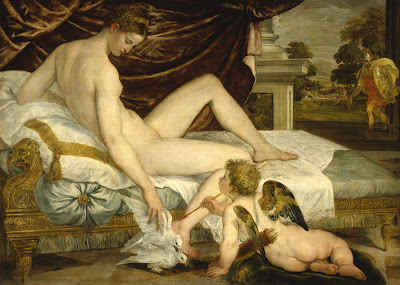When in the presence of live sex, it is hard to keep an intellectual distance. Stephen Dedalus, in A Portrait of the Artist as a Young Man, explains by way of Aquinas and Aristotle the aesthetic view that art is Art that holds one in awe, that does not move one to action. The esthetic emotion is therefore static. The mind is arrested and raised above desire and loathing. This state is that in which understanding and insight is achieved, the state of aesthetic arrest, and in this view, the polemical and the pornographic are therefore not Art.
But here we are interested in just this, the difficult boundary between awe and motion. When presented with sex at close range and with intimacy, lust is facilitated, and lust encourages motion to the object. I felt this first when I saw Shaffer's Equus as a boy, when I happened to have a seat on the stage, so close that I could smell the actors' sweat, and when the boy and the girl undressed and prepared for sex in the stable, I was overcome with a feeling of unease, although still I looked, and later, thinking on the image of the two together, I was impelled to action.
Equus is a play addressed much to the same topic as my own Certitude and Joy. The removal of the boy's religion by society is necessitated by his violence, as the removal in real life of LaShaun's intimate religion is necessitated by her violence. In both stories there is hesitation to do so, as both protagonists are in direct communication with their gods, gods both terrifying and powerful, and in the boy's case, sexually powerful as well. His sacrament is the religious ecstasy of riding the horse in an exultation of sexual bliss, and when his little death is experienced, the cum sprays - we imagine - across the sweaty frothing bare back of the horse. To achieve our purposes, we must see something of this directly on the stage: intercourse in all its varieties, raw and direct; orgasm.
For the last 10 years, I have worked with James Bisso off and on, and more off than on, on a picaresque and fictitiously autobiographical piece titled 24x7, initially our own version of My Secret Life, but now hard to pin down exactly as it has become a sprawling epic containing a series of internal sub-operas. But I feel like I need a text more interesting than My Secret Life, maybe a story of lusty adventure, possibly a new Moll Flanders set on a boy not unlike myself. Or maybe the text should be an attempt to unfluff Shortbus, a film which caught to some extent - strangely transporting it to Manhattan from San Francisco - a world I know too well, but a film which does not have the intellectual rigor of one of my own theatrical works, although it could be argued that I have missed the point that sex can be fun and simple and not necessarily dark and deep and complicated and dangerous.
If, in addition to being pornographic, I wished to commit the sin of being polemical as well, one argument I would like to make by way of this work is how closeted so many of us all still are, and a goal is to reveal those secrets that still exist in our lives, even post our modern culture's supposed sexual emancipation. And thus we attend: (1) the idea of transparency (2) how there is no sin in sex (3) and especially how Die Gedanken Sind Frei and how fantasies, of all one's thoughts, should be the most unfettered and free. The live sex should be free as well, and range from the mundane to the violent, from the passionate to the perfunctory.
Once there is an actual concept, say even a story, casting is an issue. Who would be in it? I suppose porn actors would, or sex workers of a broader variety, or sex worker advocates, or those that are old enough to not care anymore, or those that are already out in any of a variety of perversions and inversions which take them beyond this simple task. The actors cannot be individuals who are closed or closeted, like the actors in old stag film loops wearing masks as they grunt silently across the screen, as this would defeat the purpose, that of intimacy and connection and motion beyond the aesthetic. And can they sing? Or, more to the point, can they sing while discussing said aesthetics and also attending to the more athletic demands of the role, where breath and hair and tongue and taste intermix?
Friday, March 29, 2013
Toward a theory of the breakdown of the separation between audience and action
Labels:
beauty,
certitude and joy,
music,
opera,
sex
Subscribe to:
Post Comments (Atom)






No comments:
Post a Comment